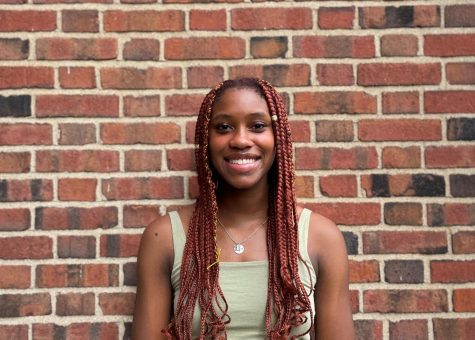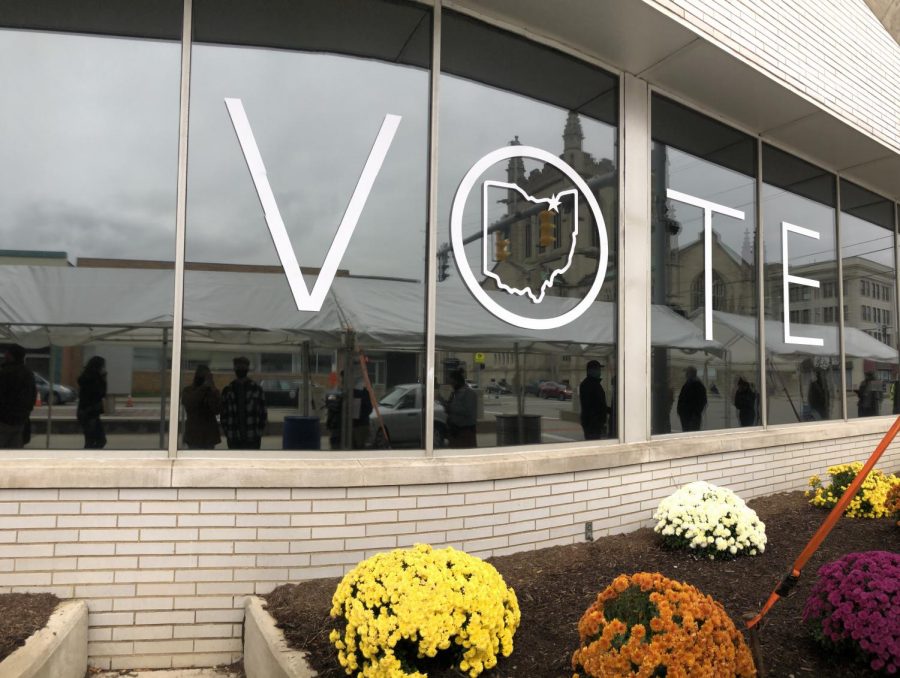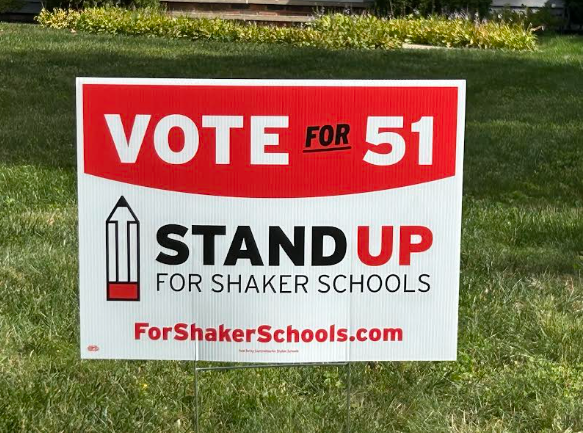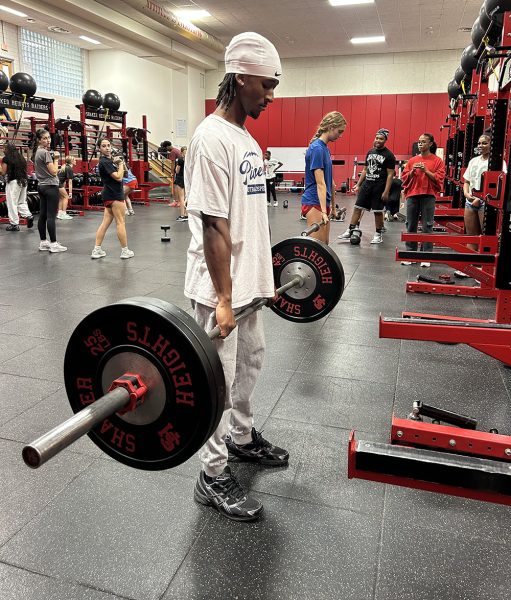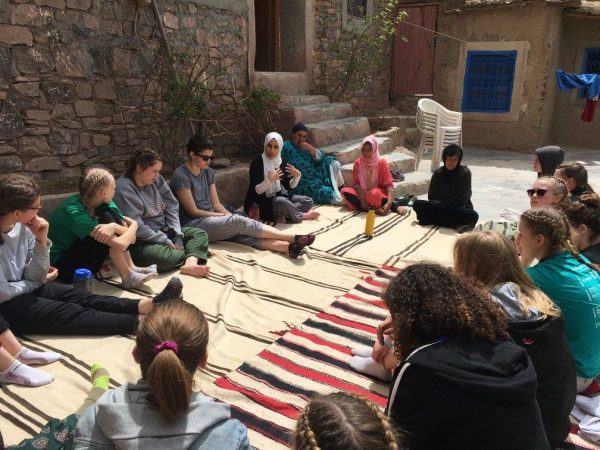Friendships or Politics: Which Comes First?
Conflicting political views can break apart long standing relationships
The outside of The Cuyahoga County Board of Elections,
Since the rise of the Black Lives Matter movement and the presidential election’s domination of social media, it’s been very clear to me who my real friends and allies are.
I’ve seen Tik-Toks and social media posts saying, “It’s 2020 and we should be able to be friends with someone who has different political views than us.” But, for me and other minorities, it’s different. As a Black person, I can’t ever see myself being friends with someone who doesn’t support the BLM movement and tries to undermine it by saying “All Live Matter” or that “BLM is a terrorist group.” Why would I want to be friends with someone who doesn’t support me as a person? Why would a member of the LGBTQ+ community want to be friends with someone who constantly says homosexuality is gross and that they will burn in hell? Why would a Muslim person want to be friends with someone who’s Islamaphobic and blames them for 9/11?
I’ve always played predominantly white sports such as soccer and volleyball and taken predominantly white classes, and I honestly get scared to talk about political issues out of fear that my views will conflict harshly with those of my peers. During seventh grade, I joined my first club volleyball team and became very close with a teammate. Our families would hang out, and she came over, despite living an hour away.
Then, one day, she posted a picture on her Snapchat of her wearing a Trump shirt and hat.
Maybe I was in a bit of denial, but I just had to ask if she was actually a Trump supporter, or if the post was a joke. I remember the moment that I asked her. We were at our last tournament, stretching, and she said, “Yeah, I love him,” with a big smile on her face.
My twin sister, India, and I looked at each other, and the way I viewed my friend completely shifted. I really just couldn’t understand how she could claim to like us so much when she supported a racist.
After that incident I didn’t purposely stop speaking to her, but I definitely didn’t make an effort to keep in contact with her. I do think that I could have been a little more open-minded, though. I think it’s important to recognize that at a young age, we only know what our parents, school and the media expose us to. For instance, I would have never known about the hardships that Native American people face to this day. I didn’t know they were forced onto reservations and about their high suicide and low high school graduation rates until I learned those things in my ninth grade English class.
We were in seventh grade when my friend posted that photo and made that comment. I think people don’t start to stray from their parents’ views until they’re a little older and actually want to learn about other people’s points of view for themselves. I also try to remember that some people are just oblivious to the problems around them. My dad once told me that a teammate’s dad said that he didn’t know that racism was still present in society today.
Oftentimes, people so quickly judge others by their political parties and whether they’re liberal or conservative. It’s not acceptable to just stop being friends with someone just because they are a Republican or a Democrat, but I draw the line for their positions on issues, and a darker line for the things they say.
For example, it’s fine to not support the right to have an abortion, but it’s not OK to say that all poeple who have abortions are murderers. It just shows me that you are unable to empathize with those who were raped, or could die if they birth the baby, or those who just are not financially or mentally stable enough to raise a child.
Again, if you say “All lives matter,” I better see you fighting for the children who have been in ICE cages since 2016. You need to help search for the thousands of Native American women who are being abducted and sold into human and sex trafficking. You should be thinking of ways to help the millions of Americans living in poverty and foster or adopt kids that you so desperately wanted to be born who ended up in the child welfare system.
You should be wearing a mask everywhere you go because you should know that without it, you could be contributing to spreading a disease that could end someone’s life.
I think the best reason to let go of a friend is if they refuse to show growth. Having a closed-minded friend who won’t ever listen to any facts that contradict their views is so draining. It’s OK to not know things; the problem comes with refusing to learn about them.
It’s also not my job to teach people what is right and wrong. Sometimes I’ll try to educate people about what they should and should not say. A lot of my friends in the past said the f-slur and called people gay as a joke, and I’ve always been sure to remind them not to say that. Now I don’t hear those insults nearly as often as I used to.
But, you can’t reach everyone. Most times, I’m not going to argue with a Trump supporter or someone in some social media comments because that is too much energy to waste on someone that I can’t change.
I think in some cases people are afraid to change their behavior because they think changing their view or actions is hypocritical. But it’s not. No one is saying you have to completely change political parties; just be more sensitive and understanding of other people’s opinions and realities. Change can be something as simple as not saying the n or f word anymore.
We often see this fear of charging stances with political candidates. They’ll be so afraid to switch views on something because they don’t want to be labeled as waffling, wishy-washy, or hypocritical and lose votes, when the truth is that change is a part of growth. When she ran for Senate in 2000, Hillary Clinton said, “Marriage has got historic, religious and moral content that goes back to the beginning of time, and I think a marriage is as a marriage has always been, between a man and a woman. But I also believe that people in committed gay marriages, as they believe them to be, should be given rights under the law that recognize and respect their relationship.”
But in March 2013, she changed her stance to full support of gay marriages. “LGBT Americans are our colleagues, our teachers, our soldiers, our friends, our loved ones. And they are full and equal citizens, and they deserve the rights of citizenship. That includes marriage. That’s why I support marriage for lesbian and gay couples. I support it personally and as a matter of policy and law, embedded in a broader effort to advance equality and opportunity for LGBT Americans and all Americans,” she said.
Her changing views on gay marriage shouldn’t be thought of as hypocrisy, but should be celebrated. In the early 2000’s most people probably didn’t support gay marriage, so the fact that she said that gay people deserve rights in the first place was pretty forward. As the times changed though, and people began realizing that members of the LGBTQ+ community are people who deserve rights, her stated beliefs changed. If we don’t allow people to shift with the times, we will never see any change or growth within our nation.
I know quite a few people from other schools in Northeast Ohio who, at first, showed me that they were not people I’d want to be friends with, people who would post the n-word upside down on their Snapchat stories or who wouldn’t stick up for me or my sister when they were snap chatting with a guy and he said we didn’t have a dad because we are Black. People I’m still friends with are those who have stopped those behaviors and now post support for BLM. Whether it’s performative or not, I admire and respect them for reposting these ideas knowing that more than half their school’s student population doesn’t agree.
Like I said before, I’ve tried to cut everyone some slack. It’s always so easy for me to forget that not every school is as diverse as Shaker, and some people literally just don’t know any Black people and have no incentive to care. I asked a girl to name five Black people besides people in my family, and she really struggled. Another girl told me that a man came to their school to talk about diversity. “I don’t even know why he came to my school. All he did was try and create problems that we don’t even have at [our school]. All the black kids after the assembly said that they didn’t care and that we aren’t racist to them,” she said.
Immediately I told her that they could just be saying that in order to not stand out, as there were only four black people in the student population. I also told her that she simply should not comment on issues that she doesn’t know about, which in this case is the struggle of being the only minority. It’s scary to think about how many people have myopic views like this.
However, I think that at this age, with all the resources available, such as social media, the internet, and the news, people should know what’s going on. At this point, not knowing about the issues of the world is more of a choice than pure oblivion.
In other cases, people with opposing values are literally just seeing different information than you. I watched the Netflix documentary “The Social Dilemma” which demonstrates that social media companies are trying to do whatever they can to keep you on their apps the longest by showing you posts that you agree with to keep you interested.
I never saw a problem with it before, but there is a page Tik-Tok called the “For You Page” that only shows you videos that you are interested in. Whenever I see a Trump supporter video, for example, it’s followed by someone calling them an idiot. Someone else’s Tik-Tok might just be talking about how Black Lives Matter is a marxist terrorist organization. We at Shaker hate Fox news, but for people in southern Ohio, it might be the only way they are consuming information.
If we all are receiving different information, coupled with fake news, it’s hard for us to even come to one conclusion of what the truth is. If my truth is that Trump has raped people and needs to be in jail, and someone else’s truth is that that never happened and was all set up by liberals to make him look bad, then we can’t even have a conversation on it because we both think what we are saying is the absolute truth. All we’ll be able to do is argue and wonder how the other can be so obtuse and ignore what we think are the facts. But that crisis of facts is another story in itself.
In the end, there’s no one reason for ending a friendship with someone who holds different political views than you. I think everyone has to decide what their limits are. When the election has passed, I think people will really know whom to let go of. If Trump loses, the way his supporters react is going to be very telling. If they continue to be hateful and supportive of his racist and misogynistic ideals, then it may be time to cut them loose. But if they decide to accept the loss, and maybe even look back and understand why supporting him made them a worse person by association, then maybe that person can continue to be in my life.
If he wins, however, I’m not sure how I will react. I may be too hurt to ever want to speak to a Trump supporter ever again. Or I may decide that I can look past their views and still want to associate with them, but I’m sure that will be an extremely rare occasion.
I’ll just have to take it day by day, person by person.
Comment using your Facebook, Yahoo, AOL or Hotmail account
